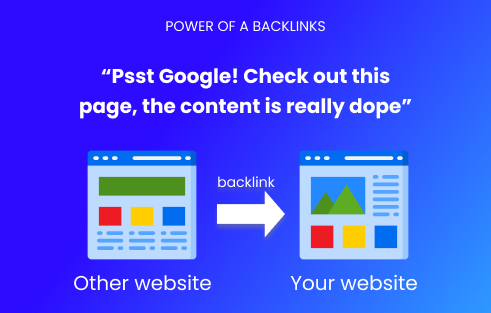SEO (Search Engine Optimization). Among the many factors that influence SEO success, backlinks stand out as a cornerstone. But what exactly is a backlink, and why is it so important? In this blog, we’ll explore the concept of backlinks, their significance in SEO, and how they can propel your website to the top of search engine results.
What Are Backlinks?
Simply put, a backlink is a link on one website that directs users to a page on another website. They are also known as inbound links because they represent traffic coming to your site from external sources.
Backlinks are like digital votes of confidence. When one website links to another, it signals to search engines like Google that the linked content is valuable, credible, and worth sharing. Think of backlinks as the web’s way of saying, “Hey, this content is worth your attention!”
Why Are Backlinks Important for SEO?
Search engines, especially Google, use backlinks as a major ranking factor. Here’s why:
1. Authority and Trust
Each backlink acts as a recommendation. When authoritative websites link to your content, it boosts your site’s credibility in the eyes of search engines.
Imagine getting a shoutout from a renowned expert in your field—it amplifies your reputation. Similarly, a backlink from a high-authority website like CNN or Forbes signals that your content is trustworthy.
2. Improved Rankings
Backlinks help search engines understand the relevance and importance of your content. Pages with more high-quality backlinks are more likely to rank higher in search engine results pages (SERPs).
For example, if two pages on the same topic compete for the top spot on Google, the one with stronger backlinks is more likely to win.
3. Referral Traffic
Backlinks don’t just help with rankings—they also drive real visitors to your site. When someone clicks a backlink on another site, they’re directed to your page. This increases visibility and opens the door for more leads, sales, or engagement.
Types of Backlinks: Not All Links Are Equal
Understanding that backlinks matter is just the beginning. It’s equally important to know that not all backlinks carry the same weight.
High-Quality Backlinks
- Relevant: Links from websites in the same niche or industry as yours are more valuable.
- Authoritative: Websites with high domain authority (DA) pass more SEO value.
- Natural: Links that occur organically, rather than through manipulation, are preferred by search engines.
Low-Quality Backlinks
- Links from spammy or irrelevant sites can hurt your SEO.
- Paid or artificially created links can violate Google’s guidelines and lead to penalties.
How Does Google Evaluate Backlinks?
Google’s ranking algorithm, known as PageRank, was revolutionary in how it assessed backlinks. This algorithm doesn’t just count links—it evaluates their quality and relevance.
For instance:
- A backlink from a page with hundreds of quality backlinks (like a popular news site) is more valuable than one from a lesser-known site.
- The anchor text—the clickable words in a hyperlink—also matters. Descriptive anchor texts pass stronger signals about the relevance of the link.
How to Build Backlinks the Right Way
Earning backlinks can be challenging but immensely rewarding. Here are some proven strategies:
1. Create High-Quality Content
The foundation of any successful backlink strategy is exceptional content. When your content is informative, engaging, and unique, other websites will naturally want to link to it.
2. Collaborate with Industry Experts
Partner with influencers, bloggers, and niche websites in your industry. Guest blogging and collaborations can help you secure backlinks from relevant and authoritative sources.
3. Leverage Relationships
If you have business partners, suppliers, or loyal customers, ask if they can mention your site on theirs. This is particularly effective for local SEO.
4. Use Testimonials and Case Studies
Offer testimonials for products or services you love. Many companies showcase customer stories on their websites and include backlinks to the customer’s site.
5. Engage in the Community
Participate in forums, comment on blogs, and share your expertise. Including your website link (when relevant) can lead to valuable connections and backlinks.
FAQs About Backlinks
What is a good backlink?
A good backlink comes from an authoritative, relevant, and trusted website. The more natural and contextual the link, the better it is for SEO.
How can backlinks hurt my website?
Backlinks from low-quality, spammy, or irrelevant sites can damage your rankings. Always focus on earning links naturally rather than buying them.
Can I build backlinks on my own?
Yes, but it requires time and effort. Creating valuable content and fostering genuine relationships are key. For professional results, you can rely on services like those offered by Impaxive.lk.
The Power of Backlinks in SEO
Backlinks are the backbone of a successful SEO strategy. They demonstrate your content’s value to search engines, improve your rankings, and increase your site’s visibility.
By focusing on high-quality, relevant backlinks, and working with trusted experts like Impaxive.lk, you can elevate your website’s authority and achieve sustainable growth in organic traffic.
Are you ready to unlock the potential of backlinks for your site? Reach out to Impaxive.lk today to learn how our SEO services can take your digital presence to the next level!




